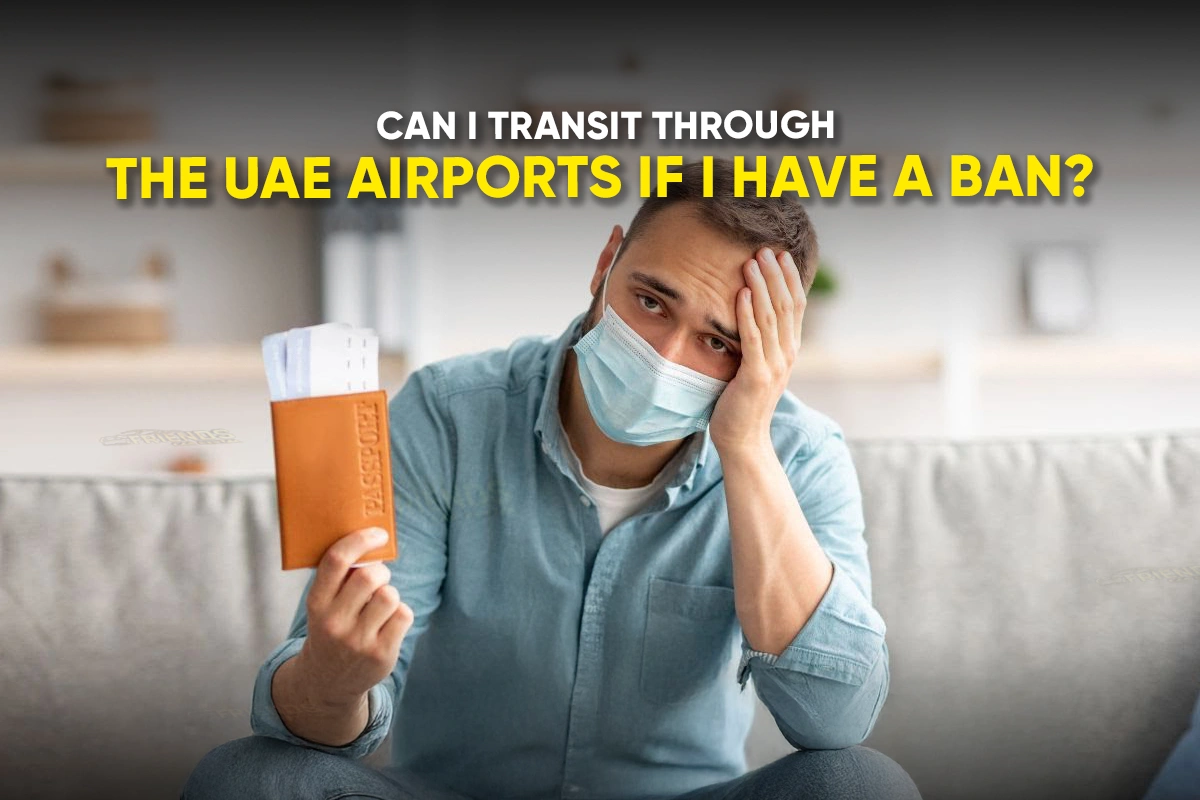Is It Possible to Transit Through The UAE Airports If I Have A Ban?

Can you transit through the UAE airports if you have a ban? The simple answer is NO — though — theoretically & technically, you’re not entering the UAE, as you’re on the airside. Let's break it down & understand in detail — why it's not recommended to transit with a ban.
UAE Airport Transit with Ban: Understanding Risks
Transit at any airport in the world means staying airside without crossing immigration. Theoretically, this should not involve any authorities or background checks. However, in reality, the authorities do intervene and scan through all passenger details.
They check passenger lists and may deny boarding at your origin, detain you on arrival, or prevent departure—even if you don't pass immigration.
Some of the key risks of transiting through the UAE airports if you have a ban in the country are:
Being deported immediately if flagged.
Getting stranded if the ban blocks your exit.
Facing arrest for unresolved issues like debts or legal cases.
To prevent such risks, airlines often deny your boarding. Many real traveler stories highlight detentions during layovers at UAE airports.
However, the in-depth understanding of transit risks in the UAE requires the proper knowledge of ban types & their impacts.
Types of Bans in the UAE & Their Impact
Not all bans are the same. Generally, there are two types of bans in the Emirates for foreigners: entry/deportation ban and travel ban. These bans have a varying impact on your travel plan with the UAE as a transit. Let’s explore these types of bans in the UAE:
1. Entry or Deportation Ban in the UAE
What It Is:
A formal restriction preventing entry into the UAE for any reason, including transit through airports like Dubai or Abu Dhabi.
Often tied to deportation: forced removal of a person from the country — automatic entry restriction.
Types:
Legal Deportation: Court-ordered for crimes (e.g., fraud, criminal convictions, or serious offenses).
Administrative Deportation: By authorities like ICP or GDRFA for immigration violations (e.g., overstaying visa, working without permit, or absconding).
Common Causes:
Immigration breaches: Overstaying visas & unauthorized entry.
Criminal acts: Drug offences, fraudulent activities, assault & violence.
Health/safety issues: Positive tests for HIV, TB; possessing banned items like CBD products or drones without approval.
Impact on Transit:
UAE authorities review passenger manifests, even if a traveler intends to remain airside without passing through immigration, leading to severe impacts, such as:
Bar's arrival or entry to the UAE, even airside (no immigration).
Possible boarding denial at origin airport (outside UAE), detention on landing/arrival, or immediate deportation.
Airlines may refuse boarding to avoid fines.
Real cases: Detentions reported for transiting with bans.
Duration and Lifting:
Often lifetime for serious cases (e.g., criminal deportations); 1-2 years for minor offenses.
To lift: Apply via GDRFA/ICP portals in the relevant emirate or ICP smart services.
Submit a formal petition with passport copy, home country police clearance, sponsor letter (e.g., from an employer or family member vouching for them).
Time: 2 weeks to 3 months, depending on the deportation reason; may need a lawyer.
Check status first: Use the Dubai Police website/app or the ICP website.
Key Risks:
Universal application: UAE laws cover all transit passengers.
No guarantees: Even minor bans can cause issues.
2. Travel Ban in the UAE
What It Is:
A legal restriction that prohibits an individual from exiting (UAE), entering, or re-entering the Emirates.
Often imposed to protect interests in ongoing legal cases (civil/criminal) in the UAE — entirely different from deportation.
Not covered by a single dedicated law. It’s based on Federal Law No. 6/1972 on immigration (and amendments like Ministerial Decree No. 83 of 2002) and Civil Procedure Code (Articles 329-330).
Common Causes:
Outstanding Debts: Unpaid loans, credit cards, and bills over AED 10,000. (creditors can request a ban if there's evidence of intent to flee).
Civil matters: Disputes (family matters: custody or divorce), bounced checks.
Criminal proceedings: Ongoing investigations for theft, fraud, or other offenses under the Penal Code.
Others: Family disputes, labor issues, unpaid government fines, or utility bills.
Impact on Transit:
While travel bans in the UAE primarily block country exit, they also sometimes extend further, including preventing entry or re-entry.
May allow entry but block departure: Strands you at the airport.
Authorities can scan passenger data at airports & detain during layover if flagged.
Applies to all travelers; no airside exemption, denied onward travel, or deported.
This applies even to layovers without immigration clearance, as airlines share manifests and may deny boarding upstream.
Duration and Lifting:
Temporary until issue resolved (e.g., pay debt, close case).
To lift: Settle the cause (e.g., pay fines, court approval).
Check status: Via police websites, ICP app, or lawyer (for multi-emirate checks).
Process: Submit proof of resolution; approval varies by emirate.
Key Risks:
Surprise enforcement: Bans can be imposed without notice.
Broader effects: May impact GCC travel if shared regionally.
For a deeper dive into the consequences of unpaid fines and how they can trigger a travel ban, check out our guide on Can You Leave Dubai Without Paying The Fines?.
Official Guidance and Exceptions
The consequences of travel ban or entry ban can be severe in the Emirates, which is why most government advisories from the US, Australia, and the UK warn against it. They cite potential arrests or denials for bans or records, alerting travelers to be extra careful, especially if they have history with the UAE.
Exceptions are rare—for minor bans without warrants—but not guaranteed. Always check first. Aside from official guidance, you can take initiatives to check for travel or entry bans in the UAE yourself, leveraging the official online portals, like Police websites, mobile applications, judicial department portals, and so on.
As you know, your history with the UAE laws and its bounds, you should make sure to check your status before selecting the UAE as your transit.
Better UAE Transit Alternatives: Skip the Hassle
It’s basic that you must stay clear of any path that can hinder your travel. Why would you want to transit to the UAE if you have some history in the country? The best way to avoid hassle is to not include the UAE in your travel plans, even as transit.
Here are some better alternatives:
Reroute your flight to avoid the UAE (e.g., via Qatar or other hubs); skip the UAE completely, even if you need to pay extra.
If you think the UAE is significant for future travels, you must resolve all the pending cases — whether travel ban or entry ban — with the related UAE authorities. Hire a lawyer for a more professional settlement of pending charges and lift the bans.
Always verify before planning your travel route. Use the UAE’s official portals to see if you have an active travel ban. Planning wisely can save you from a lot of hassle.
Final Thoughts
Hope this article successfully answered your query: Can I transit through the UAE airports if I have a ban? Transiting through the UAE airports with an active ban is very risky as you will potentially face a range of consequences, despite not crossing the immigration. Don’t ever travel to any country, even only on the airside, with a travel ban. This will completely ruin your plans. Incorporate the practical learning from this guide and make your transit a seamless process.
Written by: FriendsCarRental
Published at: Fri, Aug 22, 2025 11:42 AM
Leave a Reply
Your email address will not be published. Required fields are marked *
Car Rental in Dubai
AED 2500
DAY
AED 0
MONTH
-
 SUV
SUV -
 4 Doors
4 Doors -
 5 Seats
5 Seats
- 1 Day Rental Available
- Deposit: Not Required
- Insurance Included
AED 5500
DAY
AED 0
MONTH
-
 Sports
Sports -
 2 Doors
2 Doors -
 2 Seats
2 Seats
- 1 Day Rental Available
- Deposit: Not Required
- Insurance Included
AED 1200
DAY
AED 0
MONTH
-
 SUV
SUV -
 4 Doors
4 Doors -
 5 Seats
5 Seats
- 1 Day Rental Available
- Deposit: Not Required
- Insurance Included
AED 1600
DAY
AED 0
MONTH
-
 SUV
SUV -
 4 Doors
4 Doors -
 5 Seats
5 Seats
- 1 Day Rental Available
- Deposit: Not Required
- Insurance Included
AED 1500
DAY
AED 28500
MONTH
-
 SUV
SUV -
 4 Doors
4 Doors -
 5 Seats
5 Seats
- 1 Day Rental Available
- Deposit: Not Required
- Insurance Included

 عربي
عربي
 English
English
 Français
Français
 Русский
Русский
 中国人
中国人
 Nederlands
Nederlands
 Española
Española
 Türkçe
Türkçe
 Italiana
Italiana














































